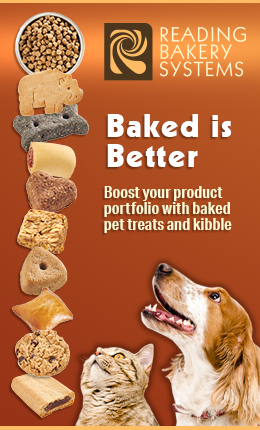Let's get to know a little more about this technology that, it seems, is coming to settle, little by little, in the food market.
Potential of pet snacks created with 3D printing
3D printers often serve as rapid prototyping and production devices. And, with the correct raw materials, some of those print creations can be consumed. As of today, most of these 3D-printed consumables are intended for humans, but the first experiments for animal food have already taken place since the technologies and ingredients for the production of pet food and meeting its requirements.
3D printing features
Also known as solid free-form manufacturing or additive manufacturing, 3D printing has a wide range of applications in different areas, such as biotechnology and design science, mechanical and biomedical engineering, aeronautical science, the pharmaceutical industry, and of course, the food industry.
Impression materials
Food materials used for extrusion-based 3D printing can be broadly categorized into natively printable materials, such as chocolate and cheese, which have excellent printing properties and extrude smoothly during printing. Second, non-printable traditional food materials, such as vegetables, meat, eggs, fish, and fruits, are non-printable by nature and require pre-processing.
Related research
Various studies have focused on analyzing the properties of different food inks and 3D-printed constructions based on animal proteins such as beef, poultry, fish, eggs, shellfish, milk, cheese, and dairy ingredients. Some studies examine the development of special diets based on animal proteins and the possibility of 3D-printed products based on cultured meat. Currently, studies have already been carried out with raw materials such as:
- Beef
- Fish
- Milk and dairy products
- Egg
- Cheese
Study conclusions
Research and studies carried out so far indicate that 3D food printing offers numerous possibilities for the development of customized structures and products based on animal proteins including, among others, extraordinary flexibility in geometries, textures and flavors, and personalized nutrition. On the other hand, this technology requires the reduction of the size of the meat particles and the dilution of the meaty and salty taste and, in general, this is expected to reduce the value of premium meat products. Precisely for this reason, it is considered a great option for the use of harder and lower-value cuts and trimmings.
The three-dimensional printing of consumables, until recently, was a utopia
Products made with 3D printing hold great potential for the pet food sector, even becoming an important marketing tool to attract new potential consumers, especially young people.
Among the various forms, 3D printing is, by far, the most impressive emerging technology available to the food industry for preparing complexly shaped, personalized foods. In addition, it provides extraordinary flexibility in geometries, textures, and flavors, and is already attracting the attention of most companies in the sector.
However, although the future looks very promising, the truth is that pet food production with 3D printing is still in an experimental stage and, of course, will require further research and significant improvements before becoming a commercial reality.
Source: All Pet Food Magazine
You could be interested: The Conscious Nutrition Era, or With Science Era, Now in Dogs and Cats
About author
María Candelaria CarbajoI’m a creative, interdisciplinary person, translator, and editor. I collaborate in producing and writing creative, high-impact projects to promote cultural exchange, transmit differential values, and connect with people/the audience. Likewise, I enjoy teamwork and joining forces, experiences, and knowledge to bring the world all the potential of those ideas that seek to impact people’s lives positively.

































